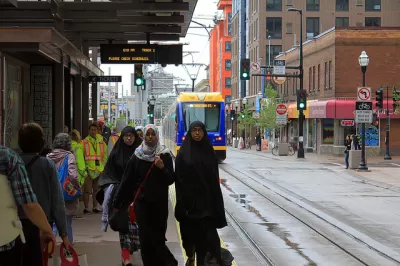As a first step in furthering goals set in the Minneapolis 2040 Comprehensive Plan, Minneapolis recently released the draft of a new ten-year transportation plan.

Miguel Otárola reports on the newly released draft of the Minneapolis Transportation Action Plan, a ten-year action plan to guide the future planning, design, and implementation of transportation projects in the city.
The guiding document, presented to the City Council’s transportation and public works committee, seeks to make other forms of transportation more accessible and appealing than driving. By doing so, city officials hope to reduce the number of vehicles on the road and lower greenhouse gas emissions that contribute to global warming.
Moreover:
A 2010 travel behavior study by the Metropolitan Council showed 68% of trips in the city were taken by car, a majority of which were by people driving alone. By 2030, transportation officials want to bring that down to 40%, according to the plan.
The draft of the plan clocks in at at 252 pages, and earned initial praise from most members of the City Council's Transportation and Public Works Committee. Councilmember Linea Palmisano, also a committee member, expressed skepticism that the plan could attain its ambitious goals.
As reported previously by Otárola, the transportation plan is intended to further the transportation goals set in the city's groundbreaking Minneapolis 2040 Comprehensive Plan.
FULL STORY: Minneapolis bets on walking, public transit to overtake driving by 2030

Maui's Vacation Rental Debate Turns Ugly
Verbal attacks, misinformation campaigns and fistfights plague a high-stakes debate to convert thousands of vacation rentals into long-term housing.

Planetizen Federal Action Tracker
A weekly monitor of how Trump’s orders and actions are impacting planners and planning in America.

In Urban Planning, AI Prompting Could be the New Design Thinking
Creativity has long been key to great urban design. What if we see AI as our new creative partner?

Florida Seniors Face Rising Homelessness Risk
High housing costs are pushing more seniors, many of them on a fixed income, into homelessness.

Massachusetts Budget Helps Close MBTA Budget Gap
The budget signed by Gov. Maura Healey includes $470 million in MBTA funding for the next fiscal year.

Milwaukee Launches Vision Zero Plan
Seven years after the city signed its Complete Streets Policy, the city is doubling down on its efforts to eliminate traffic deaths.
Urban Design for Planners 1: Software Tools
This six-course series explores essential urban design concepts using open source software and equips planners with the tools they need to participate fully in the urban design process.
Planning for Universal Design
Learn the tools for implementing Universal Design in planning regulations.
Gallatin County Department of Planning & Community Development
Heyer Gruel & Associates PA
JM Goldson LLC
City of Camden Redevelopment Agency
City of Astoria
Transportation Research & Education Center (TREC) at Portland State University
Jefferson Parish Government
Camden Redevelopment Agency
City of Claremont





























